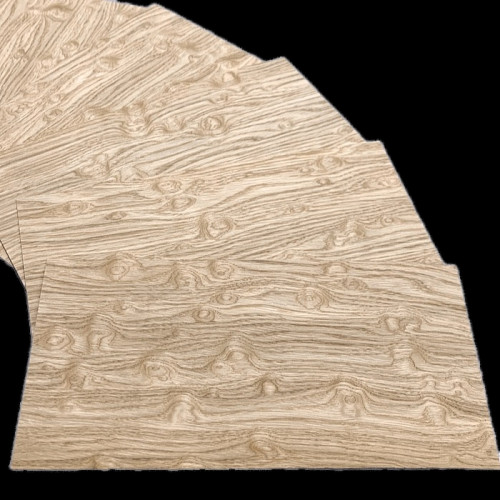
Pommele Oak Small-size Veneers
Pommele Oak Small-size Veneers
Genuine wood-sliced veneer sheets.
Fix length of 30 cm long.
Width: From 15 to 21 cm.
Thickness: 0.6 mm.
Sold by the sheet.
Pommele Oak Small-size Veneers
Genuine wood sliced-veneer sheets.
The term "pommele" is borrowed from the French meteorology term "pommelé". "Pomme," being apple in French, refers to a sky covered with small round clouds resembling apples.
In wood, the pattern produced by the grain gives the illusion of a pommele sky.
It is a rare, aesthetic characteristic usually found in species such as Tamo or Makore. But here it is oak, which is even rarer.
Dimensions:
Fix length of 30 cm long.
Width: From 15 to 21 cm.
Thickness: 0.6 mm.
Sold by the sheet.
Measurement scaling:
Width rounded to the covered centimeter: 15.8, giving 15 cm.
Species:
Common name: French oak.
Botanical Name:
- Quercus petraea (Sessile oak).
- Quercus robur (Pedunculate oak).
Origin: France.
The Sessile oak and the Pedunculate oak are the main species that make up the northern French oak groves, with some rare Pubescent oak, but this remains anecdotal.
We will notify the Holm Oak and the Cork Oak in the southern part.
They are traditionally used for building frames, shipbuilding, cooperage, cabinetmaking, carpentry, and everyday objects.
In France, it is considered the noble wood par excellence; it is the Druids' sacred tree and the tree under which Saint Louis rendered justice.
It is especially very present in the state forests whose organization and forestry are due to Colbert, minister of Louis XIV, who wanted a powerful navy and, therefore, many oak groves well organized in sustainable renewal. However, Colbert could not foresee that 250 years later, warships would no longer be made of wood by the time the trees were mature.
Oak is a very tannic wood, and it is the name of the oak in Gallic "tann," which will give tanner, tanner, tannin, etc ... The oak tannin has been used since antiquities to tan the skins. Tannin also develops woody flavors in the wine and accentuates its red color.
There are several specialties:
Brown oak:
Usually, brown rising staining of the oak base when the tree gets old, much like human hair, which turns gray/white, and like in humans, some trees turn entirely brown and sometimes barely past adolescence, except for the sapwood, which remains white.
Fumed oak:
It is an oak whose tannin has been reacted to give it a color ranging from café au lait brown to charcoal black.
Bogg oak:
These are oaks that fell in a swamp several thousand years ago. They are usually discovered during agricultural earthworks.
These oaks are in the process of fossilization and have a very particular charcoal greeny browny gray tint.
Of course, these are very rare oaks.
Flaky oak:
Flake is the medullary ray of the oak, in another way, its framework.
When we quarter-cut planks or veneer sheets in the middle of the quarter, the cutting is parallel to the medullary rays. Therefore, flakes are noticeable and create aesthetic designs.
Other specialties, such as oak burl, oak crotch, and knotty oak, will complete this non-exhaustive list.
Product Description:
Genuine wood-sliced veneer sheets.
These veneers are not in sequence and may come from different logs.
These veneers are raw without a finish or any fleece back.
The veneer surface is similar to plane wood. However, it will be preferable to forecast a light sanding after gluing.
The veneers are offered here as wood-sliced sheets of one and unique thickness.
Both faces of these veneers are the same, without fleece back or glue.
Even if the veneer's sides had been cut relatively straight, it isn't a precise parallel clipping; some veneers may have kept the decreasing shape of the tree, wider at the bottom end and narrower at the top end.
Very occasionally, some veneers' sides have traces of unclipped wane, but our veneers are measured at the narrowest, as explained in the paragraph "sizes."
As genuine natural wood, all finishing products are acceptable as long these products are meant to be for wood usage.
The choice of the finished product must be consistent with the final usage realization.
Photos:
To keep the cost of these products as cheap as possible and contrary to other veneers on this website, the pictures of small-size veneers do not represent the available stock.
More information:
Please look at our TUTORIALS; you might find some valuable tips.
Please contact us for any additional information by email or phone.
Data sheet
- Species
- Oak
- Thickness group
- Standard
- Width group
- Standard width
- Grade
- Pommele
 English
English




